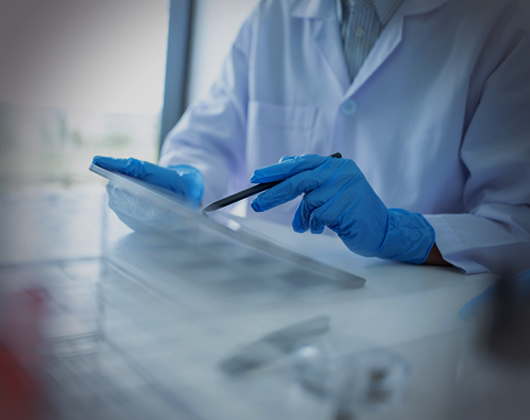The role of clinical operations is key in the delivery of successful clinical trials and plays an important part in the overall drug development process. Core responsibilities for clinical operations include ensuring volunteer safety, smooth delivery of clinical trials in accordance with the protocol, and adherence to Good Clinical Practice (GCP) guidelines at all times.
At Quotient Sciences, we have a proven track record in clinical pharmacology spanning 30 years and have successfully completed over 1,300 Phase I studies. With expertise in first-in-human (FIH) studies, our industry-leading medical directors are able to rapidly recruit large groups of healthy volunteers.
In this article, we talk to Ian Nisbet, Global Vice President of Clinical Operations at Quotient Sciences, to find out more about clinical operations at Quotient Sciences.
Where do you conduct clinical studies at Quotient Sciences?
At Quotient Sciences, we are a world leader in the delivery of clinical pharmacology studies. Our Phase I studies are run at our clinical unit in Miami, USA, where we have 144 beds with integrated pharmacy compounding capabilities, and from our clinical unit in Nottingham, UK, where we have 85 beds available. Each of our clinics can be fully integrated with our global formulation development and manufacturing capabilities, through our unique Translational Pharmaceutics® platform.
We have highly experienced medical/clinical teams on both sides of the Atlantic, with 8 permanent Principal Investigators supported by a team of 16 Sub-Investigators. Across our clinical teams, we have over 120 employees dedicated to volunteer safety and the successful delivery of clinical studies.
We deliver over 100 studies per year, including 15-20 FIH programs and over 12 14C human absorption, distribution, metabolism, and excretion (Human ADME)/mass balance studies.
What types of clinical studies are conducted at Quotient Sciences, and what is the purpose of each study type?
At Quotient Sciences, we conduct a wide range of Phase I studies, including:
- Translation Pharmaceutics programs, which integrate drug substance, drug product manufacturing, and clinical testing activities to accelerate development timelines
- FIH studies, which evaluate the safety, tolerability, and pharmacokinetics (PK) of a new drug in healthy volunteers
- Drug-drug interaction (DDI) studies, which assess if the safety and efficacy of a drug are altered when it is taken alongside other drugs
- Food effect studies, which investigate the effects of food on the rate and extent of absorption of a drug when it is taken shortly after a meal (fed conditions) compared to when it is taken under fasting conditions
- Thorough QT (TQT) studies, which test the cardiac safety of a drug
- Bioavailability studies, which determine whether a drug can reach the systemic circulation and its intended site of action while minimizing undesired side effects
- Bioequivalence studies, which compare two drugs, or two sets of formulations of the same drug, to show that they have equal bioavailability, either for generic drugs or when a formulation of a drug is changed during development
- 14C human ADME/mass balance studies, which obtain a comprehensive picture of the absorption, distribution, metabolism, and excretion of a drug in the body using radiolabeling
- Gamma scintigraphy studies, which visualize the performance of a drug in the body by adding low levels of a gamma-emitting isotope
- Japanese bridging studies, which compare the safety and efficacy of a drug in different ethnic groups
When conducting FIH studies, what types of samples are usually collected and how is this done?
Typically, safety and tolerability are the primary objectives for FIH studies, where we capture safety data including vital signs, electrocardiograms (ECGs), blood parameters, and adverse events across a wide range of single and multiple doses. Often, we may also collect additional cardiac data via telemetry or Holter monitoring.
Our clinical units have all the necessary clinical equipment available to perform safety monitoring and data collection in accordance with the clinical protocol.
We also collect blood and/or urine and fecal samples for analysis, so that PK or pharmacodynamic (PD) profiles can be generated to provide an understanding of how the drug is processed by the body. On occasion, it may also be necessary to collect genotype samples to help assess whether the metabolizer status impacts on drug absorption.
How are samples processed in the clinic?
Samples are collected on the ward and transferred to our sample processing laboratories to be processed. We have a barcode tracking system in place to track the samples through the collection/processing pathways, which typically include centrifugation followed by plasma/serum isolation.
Our in-house laboratories have the capability to perform PD sample processing, including the collection and processing of peripheral blood mononuclear cell (PBMC) samples for isolation. There are several processing techniques available that may be utilized during sample processing, with Quotient Sciences typically using the Cell Preparation Tube (CPT) or LeucoSep methods. PBMC collection and processing require specific blood collection tubes, reagents, and equipment to be available and for each step in the method to be followed accurately to ensure isolation of the cells can occur.
Samples are processed in accordance with the Lab Manual for appropriate storage until they are shipped to the nominated bioanalytical laboratory for analysis. Once analyzed, the data is returned to the data sciences PK function for PK analysis to be performed.
How do you ensure the safety of volunteers while they take part in clinical studies?
At Quotient Sciences, we ensure that we meet regulatory GCP requirements by having “best practice” procedures that encompass the highest standards for avoiding harm to trial volunteers.
All studies conducted at Quotient Sciences are risk-assessed to ensure we can determine the appropriate levels of oversight and monitoring needed to safely conduct the study.
Our clinical teams are made up of experienced physicians, nurses, and clinical technicians. Clinical staff are trained in Basic and Immediate Life Support, with all of our physicians trained in Advanced Life Support. Our clinical units have all the necessary emergency equipment and medicines available to handle any medical emergency.
How do you ensure that volunteers have a positive experience while they take part in clinical studies?
We have a volunteer-centric approach, with key touchpoints at each stage of our volunteer’s journey, including volunteer feedback questionnaires.
We also have a “Volunteer Centricity” group, which is focused on ensuring feedback is acted upon and priorities around volunteer wellbeing are considered. The group engages with a “Volunteer Advocacy” panel, which is made up of regular long-standing volunteers, to ensure that feedback is sought on an array of topics, such as the layout and wording of patient information summaries, admission times, transportation to the site, and study design.
Our clinical units have recreational and dining spaces for our volunteers to relax and unwind when procedures are not being performed. We have Volunteer Liaison Officers, who are responsible for arranging activities and acting as key touchpoints for our volunteers, as well as providing a comfortable environment for them to stay in.
Our highly skilled teams ensure the volunteers feel safe, valued, and looked after while in our units.
Click here to find out more about Quotient Sciences’ clinical pharmacology services.

